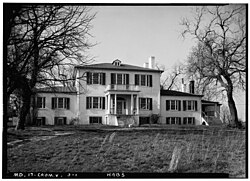Mattaponi (John Bowie Jr. House)
| Mattaponi | |
|---|---|
 | |
 | |
| Former names | Brooke's Reserve |
| Alternative names | John Bowie, Jr. House |
| General information | |
| Coordinates | 38°44′20″N 76°44′36″W / 38.73889°N 76.74333°W |
| Completed | c. 1820 |
Mattaponi, also known as the John Bowie Jr. House, is a historic home in Croom, Maryland, built c. 1820 on the foundation of an earlier house dating to the 1730s,[1] three miles northwest of Nottingham, Prince George's County, Maryland.[2]
John Bowie, Sr., who emigrated to colonial Maryland in 1705 from Scotland, purchased a large tract of land called "Brooke's Reserve" about two miles west of Nottingham for a son, Captain William Bowie, when the son was twenty-one years old. A large brick house was erected there that was called Mattaponi, the name of the nearest creek and a Native American word meaning "meeting of the waters".[1] The tract of land later became known by the name for the house.[3] The current house is the second, being built on the foundation of the first. A tribe by the name Mattaponi resided in what would become colonial Virginia.
The Bowie family had extensive landholdings in the county and were important politically.[4] They settled in and near Nottingham during the colonial period, building a number of homes including Mattaponi.[3]
Robert Bowie, Governor of Maryland from 1803 to 1806 and 1811–12, is buried at Mattaponi and is believed to have been born there as well,[3] although this is not proven; as an adult, he made his residence at "The Cedars" in Nottingham on the Patuxent River.[1] Mattaponi is very similar in styling to the home he built nearby for his daughter, Bowieville, also brick covered with stucco.[4]
Walter Bowie also was born at Mattaponi.[3][5]
In December 1846, Richard Lowndes Ogle married Priscilla Mackall Bowie at Mattaponi.[6]
References
[edit]- ^ a b c Cooke, Margaret W. "Prince George's County Historic Site Summary Sheet" (PDF). Maryland Historic Trust.
- ^ "Mattaponi" (PDF). Historic American Buildings Survey. Washington, D.C.: Library of Congress.
- ^ a b c d Hall, Clayton Colman (1912). Baltimore: Its History and Its People, Vol. 3. Lewis Historical Publishing Co. pp. 300–301.
- ^ a b Lavoie, Catherine C. (1989). "Bowieville" (PDF). Historic American Buildings Survey. Washington, D.C.: Library of Congress.
- ^ Spencer, Richard Henry (1919). Genealogical and Memorial Encyclopedia of the State of Maryland. New York: American Historical Society. p. 388. ISBN 0-8328-5943-5.
- ^ "Archives of Maryland (Biographical Series) Richard L. Ogle (b. 1819 - d.1895)". Maryland State Archives. Retrieved 12 January 2013.
External links
[edit]- Historic American Buildings Survey (HABS) No. MD-651, "Mattaponi, Mattaponi Road, Nottingham, Anne Arundel County, MD", 3 photos
